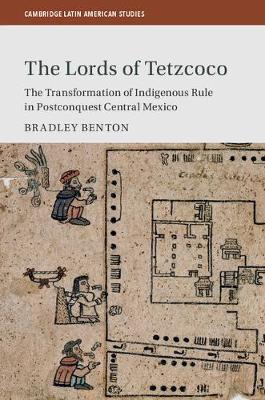
Stock image for illustration purposes only - book cover, edition or condition may vary.
Cambridge Latin American Studies: Series Number 104: The Lords of Tetzcoco: The Transformation of Indigenous Rule in Postconquest Central Mexico
Bradley Benton
€ 117.74
FREE Delivery in Ireland
Description for Cambridge Latin American Studies: Series Number 104: The Lords of Tetzcoco: The Transformation of Indigenous Rule in Postconquest Central Mexico
Hardcover. .
Tetzcoco was one of the most important cities of the pre-Hispanic Aztec Empire. When the Spaniards arrived in 1519, the indigenous hereditary nobles that governed Tetzcoco faced both opportunities and challenges, and were forced to adapt from the very moment of contact. This book examines how the city's nobility navigated this tumultuous period of conquest and colonialism, and negotiated a place for themselves under Spanish rule. While Tetzcoco's native nobles experienced a remarkable degree of continuity with the pre-contact period, especially in the first few decades after conquest, various forces and issues, such as changing access to economic resources, interethnic marriage, and intra-familial conflict, transformed Tetzcoco's ruling family into colonial subjects by the century's end.
Product Details
Publisher
Cambridge University Press
Format
Hardback
Publication date
2017
Series
Cambridge Latin American Studies
Condition
New
Weight
28g
Number of Pages
212
Place of Publication
Cambridge, United Kingdom
ISBN
9781107190580
SKU
V9781107190580
Shipping Time
Usually ships in 4 to 8 working days
Ref
99-1
About Bradley Benton
Bradley Benton is Assistant Professor of History at North Dakota State University. His areas of research include Colonial Mexico; Aztec politics, society, and culture; the early-modern Atlantic world; and cross-cultural contact and exchange.
Reviews for Cambridge Latin American Studies: Series Number 104: The Lords of Tetzcoco: The Transformation of Indigenous Rule in Postconquest Central Mexico
'Tetzcoco was known in pre-hispanic and colonial central Mexico not only as the leading city-state in the Acolhuacan region, major partner in the Triple Alliance, but also as a center of law and culture. Its ruling dynasty produced two of the major chroniclers of native indigenous cultural and history, both of whom played roles in the region's governance despite their mixed-race background as this gracefully written history shows. The political history of the ruling family and the colonial vicissitudes they endured has needed a chronicler and Bradley Benton has proven to be the historian to provide it.' Susan Kellogg, Director of Undergraduate Studies and Latin American Studies, University of Houston 'The Lords of Tetzcoco makes a vital contribution to the rich scholarship on Mesoamerica's postconquest indigenous elite. Benton uses a wide array of sources in Nahuatl and Spanish to trace continuity and change in indigenous political authority in the early colonial period, highlighting how the native elite navigated the challenges of the Spanish regime. His detailed narrative brings to life the ambitions, machinations, and resilience of the indigenous rulers of the 'Athens of Anahuac'.' Yanna Yannakakis, Emory University, Atlanta 'This book is a prime exhibit of the sophisticated approach that a new generation of historians has brought to indigenous social history. Benton deftly pulls together strands from Spanish, and some Nahuatl, language sources to weave a vibrant history of the colonial aristocracy of Tetzcoco, a powerful Nahua polity in sixteenth-century Mexico.' David Tavarez, author of The Invisible War and co-author of Chimalpahin's Conquest and Painted Words 'Students of the period will appreciate Benton's ability to toggle between marquee history (the fall of Tenochtitlan, the plague of sheep) and the smaller dramas unfolding in Tetzcoco, particularly within the palace walls. The book makes the most of the sometimes scant historical sources for the period and offers nuanced readings of better known ones.' Barbara Mundy, The Americas 'Benton's work balances admirably clear context with rich personal stories based on meticulous archival research, and it is excellent to see him foregrounding the experiences and voices of women throughout his analysis.' Caroline Dodds Pennock, H-LatAm 'Tetzcoco was known in pre-hispanic and colonial central Mexico not only as the leading city-state in the Acolhuacan region, major partner in the Triple Alliance, but also as a center of law and culture. Its ruling dynasty produced two of the major chroniclers of native indigenous cultural and history, both of whom played roles in the region's governance despite their mixed-race background as this gracefully written history shows. The political history of the ruling family and the colonial vicissitudes they endured has needed a chronicler and Bradley Benton has proven to be the historian to provide it.' Susan Kellogg, Director of Undergraduate Studies and Latin American Studies, University of Houston 'The Lords of Tetzcoco makes a vital contribution to the rich scholarship on Mesoamerica's postconquest indigenous elite. Benton uses a wide array of sources in Nahuatl and Spanish to trace continuity and change in indigenous political authority in the early colonial period, highlighting how the native elite navigated the challenges of the Spanish regime. His detailed narrative brings to life the ambitions, machinations, and resilience of the indigenous rulers of the 'Athens of Anahuac'.' Yanna Yannakakis, Emory University, Atlanta 'This book is a prime exhibit of the sophisticated approach that a new generation of historians has brought to indigenous social history. Benton deftly pulls together strands from Spanish, and some Nahuatl, language sources to weave a vibrant history of the colonial aristocracy of Tetzcoco, a powerful Nahua polity in sixteenth-century Mexico.' David Tavarez, author of The Invisible War and co-author of Chimalpahin's Conquest and Painted Words 'Students of the period will appreciate Benton's ability to toggle between marquee history (the fall of Tenochtitlan, the plague of sheep) and the smaller dramas unfolding in Tetzcoco, particularly within the palace walls. The book makes the most of the sometimes scant historical sources for the period and offers nuanced readings of better known ones.' Barbara Mundy, The Americas 'Benton's work balances admirably clear context with rich personal stories based on meticulous archival research, and it is excellent to see him foregrounding the experiences and voices of women throughout his analysis.' Caroline Dodds Pennock, H-LatAm
